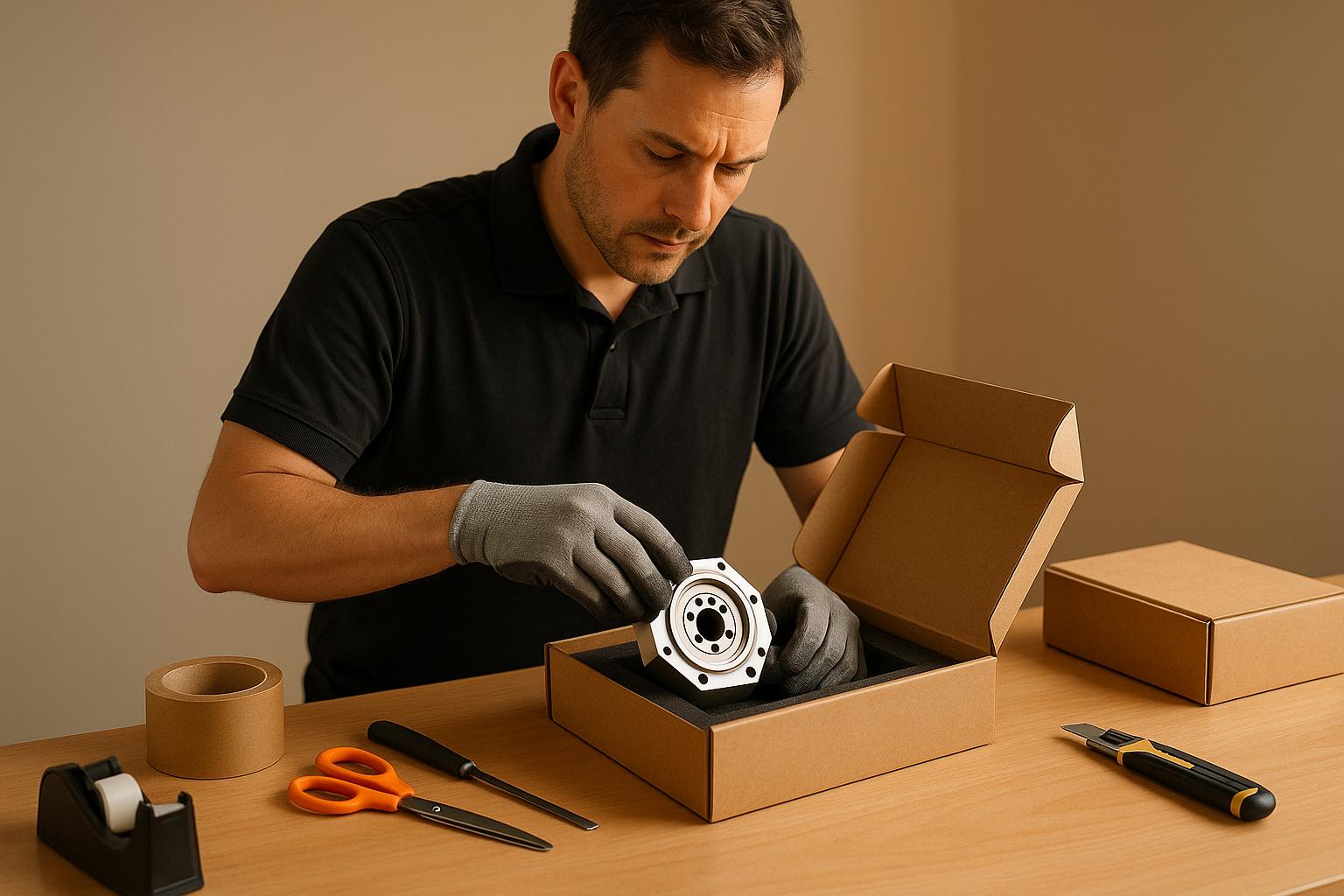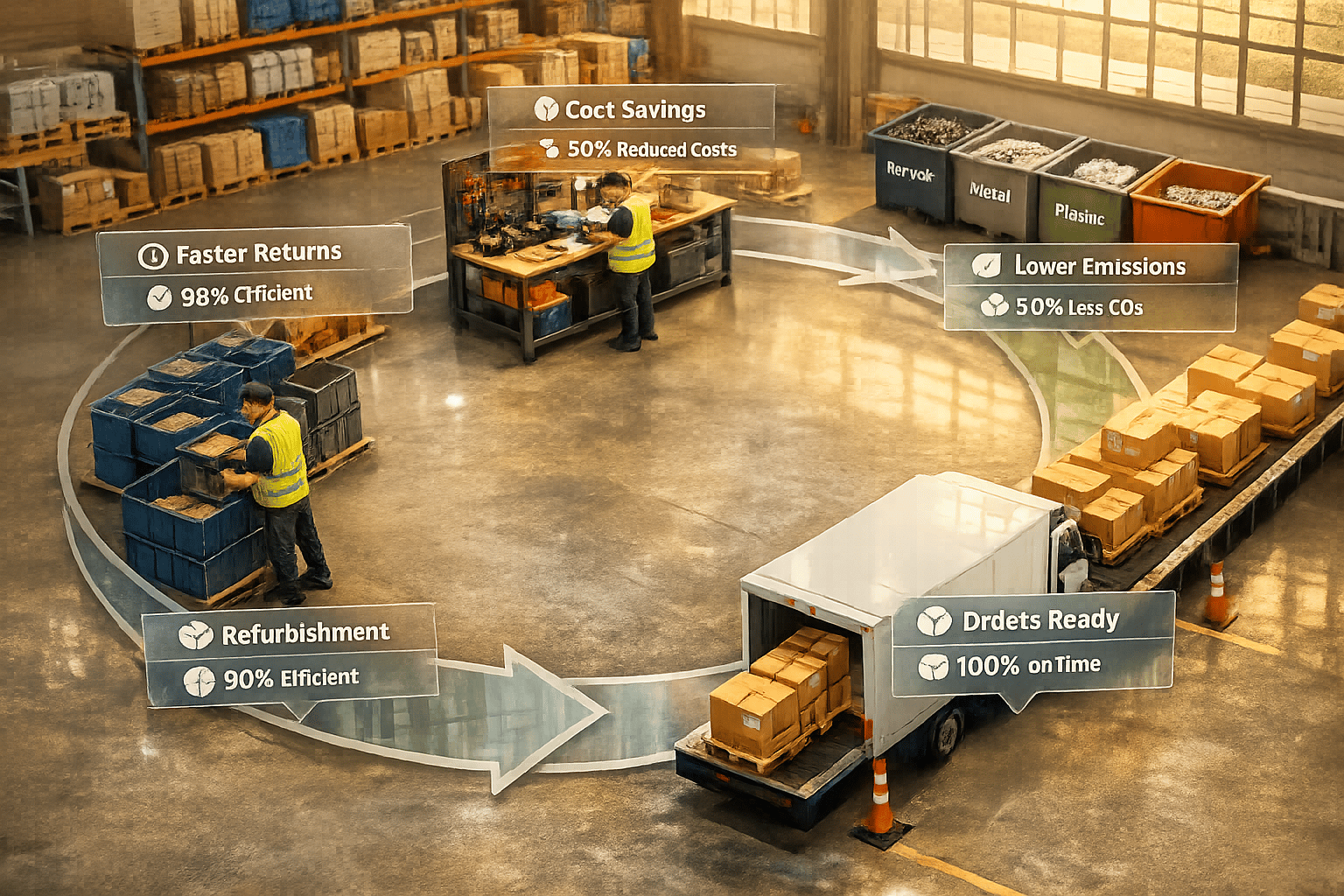Pick & Pack for Precision Products: Why Detail Matters in Fulfillment

Mistakes in fulfillment can cost your business more than just money - they can erode trust and damage your reputation. When handling precision products like electronics, medical devices, or luxury goods, even small errors in picking, packing, or shipping can lead to significant financial losses, compliance issues, and customer dissatisfaction.
Here’s what you need to know:
- Precision products require extra care: These items are fragile, high-value, or regulated, needing specialized packaging, tamper-proof seals, and strict tracking.
- Accuracy is non-negotiable: Errors like mis-picks, poor packaging, or compliance failures can result in damaged goods, costly returns, or regulatory fines.
- Technology ensures efficiency: Tools like barcode scanning, RFID, and automated systems reduce errors and improve inventory accuracy.
- Custom solutions matter: Tailored packaging, real-time tracking, and quality control processes are critical for protecting these products during transit.
- JIT Transportation’s approach: Their scalable fulfillment solutions include specialized handling, nationwide warehouses, and advanced tracking for precision products.
Bottom line: Attention to detail in fulfillment builds customer trust, reduces costs, and ensures compliance with strict standards. Businesses that prioritize accuracy and leverage technology can meet the growing demands of precision products while maintaining efficiency.
3PL Secrets for Consumer Electronics Fulfillment
Main Challenges in Precision Fulfillment
Tackling the challenges of precision fulfillment is vital to maintaining the high standards demanded for handling sensitive and valuable items. The stakes are high, and any misstep can disrupt operations and erode customer trust. By understanding these challenges, businesses can better navigate the complexities of managing precision products.
Common Risks in Handling Precision Products
Product damage is one of the most immediate risks. Electronics, for instance, are vulnerable to static discharge, moisture, and physical impacts. Medical devices can lose sterility if seals are compromised, and luxury goods are at risk of scratches or dents from mishandling. Each of these scenarios can lead to significant losses.
Mis-picks can have a ripple effect on costs and customer satisfaction. Imagine shipping the wrong model of a $2,000 laptop: the incorrect item goes to a customer, the intended product remains unavailable for other orders, and the business incurs additional costs for returns and restocking - all while frustrating the customer.
Compliance failures can be catastrophic, especially in regulated industries. Pharmaceutical companies, for example, must adhere to FDA requirements like maintaining specific temperatures, documenting chain-of-custody, and using tamper-evident packaging. A single temperature fluctuation during transit can render an entire shipment unusable, leading to heavy financial losses and potential fines.
Returns and exchanges are particularly costly for precision items. Unlike a simple clothing return, precision products often need specialized inspections, repackaging, and even recertification before they can be resold. In some cases, such as with regulated goods, resale may not be an option at all once the item has left its controlled environment.
US Standards for Precision Fulfillment
In the United States, the imperial measurement system plays a significant role in precision fulfillment. Warehouse layouts are designed with feet and inches, weight limits are calculated in pounds, and temperature controls are measured in Fahrenheit. These factors influence everything from storage design to shipping logistics.
Packaging regulations are strict and vary by product type. For example, the Department of Transportation (DOT) enforces specific guidelines for shipping lithium batteries, including requirements for box sizes, cushioning materials, and hazard labeling. Similarly, the FDA sets detailed packaging standards for medical devices, such as sterile barrier systems and validation protocols.
Handling requirements for fragile items demand industry-specific precautions. Electronics often require anti-static packaging and controlled environments with humidity levels below 60%. Temperature-sensitive items, on the other hand, need cold chain management to maintain precise conditions during storage and transit.
Documentation standards are another cornerstone of precision fulfillment. Detailed records are required for traceability, including lot numbers, expiration dates, serial numbers, and handling logs. Certificates of authenticity, calibration records, and compliance documents often need to accompany shipments, ensuring accountability and regulatory adherence.
These stringent standards highlight the importance of precision and accuracy in every step of the fulfillment process.
Why Inventory Accuracy Matters
When it comes to precision products, real-time visibility is non-negotiable. A single miscount - say, a batch of $500 components - can disrupt financial forecasts and leave customers waiting for items that appear in stock but aren’t. Long replacement lead times for many precision items only add to the urgency of inventory accuracy.
Accurate lot tracking, expiration management, and serial number monitoring are essential for managing warranties, recalls, and stock rotation. First-in, first-out (FIFO) practices help prevent losses from expired inventory while ensuring traceability from receipt to shipment.
To maintain this level of precision, businesses rely on regular cycle counts, barcode verification, and seamless system integration across inventory, order, and shipping processes. These measures not only reduce errors but also build trust with customers by ensuring timely and accurate deliveries. Leveraging modern tools and technologies is key to meeting these demands while keeping operations efficient.
Using Technology for Accuracy and Efficiency
Technology plays a crucial role in ensuring accurate and efficient fulfillment, particularly for high-value products. By replacing manual, error-prone processes with automated systems, businesses can scale operations without sacrificing precision. As fulfillment challenges grow more complex, these tools become essential for maintaining high standards of accuracy and efficiency.
Order Management Systems and Integration
Integrated systems like OMS (Order Management Systems), WMS (Warehouse Management Systems), and ERP (Enterprise Resource Planning) work together to ensure smooth operations. These systems update inventory in real time, reserve serial-numbered items, and initiate customized picking processes as soon as an order is received. This seamless flow of information eliminates data silos and prevents overselling by automatically blocking allocated inventory and keeping available-to-promise quantities accurate.
Automated routing further enhances efficiency by directing orders to the best fulfillment location based on factors like inventory levels, shipping needs, and customer proximity. For example, temperature-sensitive pharmaceuticals are routed to facilities with cold storage capabilities, ensuring the cold chain is maintained while factoring in transit times.
Barcode and RFID Scanning
Barcode scanning ensures accuracy at every step of the fulfillment process. Workers scan products to verify item details, quantities, and destinations before moving them along. This real-time verification significantly reduces picking errors.
RFID (Radio Frequency Identification) technology takes it a step further by enabling bulk scanning without requiring a direct line of sight. A single RFID scan can verify entire boxes, checking quantities, part numbers, and lot codes simultaneously. This is especially useful for small, high-value items like semiconductor components.
Mobile scanners add another layer of precision by capturing serial numbers and packaging condition through images. These images are stored as part of the shipment record, providing visual proof of an item’s condition at the time of dispatch. Scanning systems also flag exceptions, such as products nearing expiration, items on quality hold, or units needing specific packaging, ensuring they are routed to the right personnel for special handling.
Automation in Picking and Packing
Automated systems like AS/RS (Automated Storage and Retrieval Systems) manage high-value inventory with precision, optimizing space usage and ensuring items are stored under ideal conditions. Pick-to-light systems guide workers through complex picking tasks using LED displays that highlight the correct locations and quantities. Meanwhile, robotic packing stations maintain consistent packaging quality by applying the right amount of cushioning and selecting the appropriate box size.
Conveyor systems with automated sorting further streamline the process by routing packages based on shipping requirements, destination zones, or special handling needs. For instance, items requiring signature confirmation or expedited shipping are automatically directed to the appropriate processing areas.
These technologies create a scalable framework that upholds accuracy, even as order volumes grow. Unlike manual processes, which are prone to errors under pressure, automated systems deliver consistent performance regardless of workload or time constraints. Additionally, data analytics from these systems provide valuable insights into operations, helping identify bottlenecks and uncover opportunities for improvement.
sbb-itb-eafa320
Best Practices for Quality Control in Pick and Pack
Quality control turns routine verification and packaging steps into proactive measures that ensure accuracy and reliability in fulfillment. Whether you're handling high-value electronics, medical devices, or delicate components, these practices can make the difference between satisfied customers and costly returns.
Verification Steps to Follow
- Multi-Point Verification: At every stage - picking, packing, and shipping - use item scanning, confirm quantities, and check product condition to catch errors early.
- Shift Handoff Protocols: Record special handling instructions, flag incomplete tasks, and ensure smooth communication between shifts to avoid mix-ups.
- Dual Verification for High-Value Orders: Require a second team member to double-check picked items, reducing the risk of substitutions, mismatches, or unnoticed damage.
- Quality Control for Failed Items: Route damaged products or items with serial mismatches to a dedicated quality control team for resolution.
These steps set a strong foundation for the next stages: packaging and labeling.
Custom Packaging Techniques
- Tailored Packaging: Use fitted boxes with custom foam inserts or anti-static materials to keep items secure and minimize movement during transit.
- Fragility-Specific Protection: Choose materials based on the product’s needs - closed-cell foam for precision instruments or insulated packaging for temperature-sensitive goods.
- Weight Distribution: Place heavier items at the bottom and lighter ones on top, using dividers to maintain balance and prevent crushing.
- Appropriate Box Strength: Match box durability to the product - single-wall corrugated boxes work for sturdier items, while double-wall construction is better for fragile or heavy goods.
Strong packaging methods pair seamlessly with clear labeling to uphold product integrity throughout the shipping process.
Labeling and Traceability Essentials
- Clear Handling Instructions: Mark packages with labels like "Fragile" or "This Side Up" to guide proper handling.
- Integrated Tracking Systems: Use internal lot numbers and carrier codes to maintain a continuous chain of custody.
- Return Labels: Include prepaid return labels and clear instructions for high-value items to simplify returns.
- Detailed Documentation: Take photos, verify weights, and record carrier handoff details to support damage claims and refine processes.
JIT Transportation's Scalable Solutions for Precision Fulfillment

JIT Transportation uses a combination of smart logistics, advanced technology, and tailored services to meet the exacting needs of precision fulfillment. By relying on strict quality standards and automation, their scalable solutions handle the increasing demands of delivering high-value and delicate products with accuracy.
Nationwide Network and Warehouse Locations
With warehouses spread across the country, JIT Transportation ensures products are stored closer to customers, reducing both shipping times and costs. This strategic setup means that whether it’s medical devices heading to hospitals in Texas or electronic components bound for manufacturers in Michigan, shipments start from locations that minimize transit risks and handling.
Placing warehouses in key regions also helps businesses save money through practices like zone skipping and consolidated shipping. By routing products to regional hubs for localized delivery, companies can cut down on shipping costs and reduce the chances of damage caused by excessive handling or multiple transfers.
Advanced Technology and Real-Time Tracking
JIT Transportation relies on a robust technology platform to provide full visibility and control throughout the shipping process. Their 24/7 cloud-based system, integrated with EDI, enables real-time shipment tracking.
"Our tracking system integrates with our logistics network and carrier partners. We leverage advanced technologies to capture and transmit real-time data." - JIT Transportation
Using satellite communications and GPS mapping, shipments are constantly monitored with precision. Partnerships with industry leaders like Samsara and Prepass further enhance tracking while helping reduce cargo claims. Automated updates via email, SMS, or mobile alerts keep everyone in the loop at critical points. Additionally, interactive maps allow users to view shipment routes and access detailed information.
This technological framework supports services that can be tailored to meet the specific needs of different products.
Flexible and Customizable Services
Building on their tracking and automation capabilities, JIT Transportation offers highly customizable fulfillment options. Their pick-and-pack services are designed to meet specific packaging requirements, whether it’s anti-static materials for electronics or extra cushioning for fragile instruments.
Kitting and assembly services combine components into ready-to-ship packages, streamlining the process and reducing handling risks. For items that need extra care, white-glove handling ensures meticulous inspections, custom packaging, and specialized attention during transit.
Additional offerings include a vendor-managed inventory (VMI) program that keeps stock levels optimized with automated reordering and detailed reporting. Their returns management (RMA) service handles reverse logistics with care, determining whether returned items should be restocked, refurbished, or disposed of responsibly.
These adaptable services, supported by real-time data and strict quality standards, deliver precision at every stage of the fulfillment process.
Conclusion: Building Trust Through Precision and Detail
Getting fulfillment right is non-negotiable for e-commerce, especially when handling high-value items like electronics, medical devices, or delicate instruments. Customers expect their orders to arrive on time, in perfect condition, and exactly as promised. A single misstep during the pick-and-pack process can lead to damaged relationships, costly returns, and revenue losses that ripple far beyond the initial mistake.
The stakes are even higher when dealing with precision products. For these items, accuracy isn’t just a nice-to-have - it’s a must. Mishandling can disrupt production lines or, worse, compromise patient care. In this context, attention to detail becomes absolutely critical for maintaining trust and protecting a business's reputation.
Key Takeaways
Three core elements drive successful precision fulfillment: advanced technology, strategic infrastructure, and tailored processes. Barcode scanning, RFID tracking, and automated quality checks are essential tools to eliminate errors. Without these safeguards, even the most diligent teams will struggle to meet the accuracy required for precision products.
Strategic warehouse placement across the U.S. helps reduce transit times and handling risks. Meanwhile, specialized packaging solutions act as a protective shield for products during transit. Think anti-static materials for electronics, temperature-controlled storage for sensitive goods, and white-glove handling for fragile items. Together, these measures create a level of protection that standard fulfillment processes simply can’t provide.
JIT Transportation highlights these principles in action. Their scalable, tech-driven solutions - like vendor-managed inventory programs, returns management systems, and kitting services - offer the specialized care that precision products demand, all while maintaining the speed and efficiency modern e-commerce requires.
Continuous Improvement in Fulfillment
Precision fulfillment isn’t a "set it and forget it" operation - it thrives on constant refinement. Regular audits of picking accuracy, packaging quality, and shipping performance are vital to spotting and fixing potential issues before they affect customers. These evaluations should dig into error rates, damage claims, and customer feedback to paint a full picture of what’s working and what isn’t.
Feedback loops are equally important. Whether it’s a customer flagging a packaging problem or a warehouse team noticing a recurring issue, these insights should feed directly into updates for processes and training. The best fulfillment operations treat every challenge as a chance to get better.
Technology also plays a central role. As business needs evolve, so must the tools and systems that support fulfillment. This includes adopting advanced scanning technologies, enhancing tracking capabilities, and improving integration with customer systems. Regular updates to warehouse management systems, staff training, and quality control measures ensure operations not only meet industry standards but push beyond them.
Investing in precision fulfillment pays off. It reduces returns, improves customer satisfaction, and builds stronger partnerships. Companies that focus on detail-oriented processes position themselves as trusted allies in their customers' success - offering advantages that go well beyond any single transaction.
FAQs
How do technologies like RFID and barcode scanning improve accuracy in fulfilling precision products?
Technologies like RFID and barcode scanning are game-changers when it comes to boosting accuracy in the fulfillment process for precision products. With RFID, you can track items in real time without needing a direct line of sight. It even allows multiple items to be scanned at once, cutting down on manual errors and keeping inventory records spot-on - a must for handling high-value or delicate goods.
Meanwhile, barcode scanning steps in as a dependable method to confirm product details at every stage of the process. Together, these tools help prevent misplaced items, streamline workflows, and tighten security, ensuring orders are handled with care and delivered exactly as intended.
What special packaging and handling are required for precision products like electronics and medical devices?
Packaging and handling for precision products must focus on protection and meeting regulations to ensure they stay safe during transit. For electronics, shielding them from moisture, dust, temperature fluctuations, and physical harm is critical. Common solutions include using anti-static wraps and shock-absorbing padding to minimize risks.
When it comes to medical devices, the packaging must preserve sterility, withstand chemical exposure, and guard against external factors. These materials undergo extensive testing to comply with strict regulatory standards and maintain the device's integrity.
In both cases, careful handling and the use of top-quality materials are essential to ensure these products reach their destination intact and in perfect working order.
Why is it crucial to maintain accurate inventory for high-value precision products, and how can businesses achieve this?
Accurate inventory management is crucial when dealing with high-value precision products. Even small mistakes can result in expensive problems like stock shortages, excess inventory, or shipping errors. Beyond the financial hit, these issues can erode customer trust and satisfaction.
To maintain precision, businesses can turn to modern inventory management systems, conduct regular cycle counts, and use tools like barcode scanners or RFID technology. These methods reduce errors, enhance tracking, and provide dependable stock data, ensuring operations run smoothly and customers stay happy.
Related Blog Posts
Related Articles

How 3PLs Support Circular Supply Chain Models

Top Challenges in Returns AI Solves

